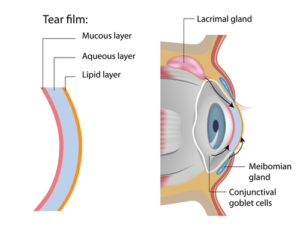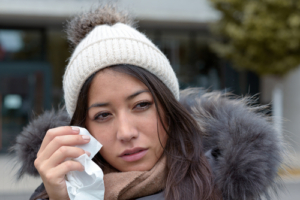Why Are My Eyes So Much Drier in the Winter?
Do your eyes feel dry or irritated? With colder weather, it’s not uncommon if you start experiencing dry eye symptoms that seem to worsen.
The winter can speed up the evaporation of tears and exacerbate dry eye symptoms. Your eyes become drier when you use the heat to keep warm inside or whenever you’re exposed to crisp, cold air outdoors.
Unfortunately, when you have dry eyes, it makes looking at digital devices or screens very uncomfortable. The condition tends to worsen as the day goes on and can get in the way of having a good night’s sleep.
Keep reading to learn more about having dry eyes and how to handle them this winter!
What is Dry Eye Syndrome?

Dry eye syndrome occurs when you don’t produce enough tears, or you produce tears that are low in quality. Without enough tears, you won’t be able to lubricate your eyes properly, leading to feelings of dry, itchy eyes.
Symptoms of having dry eyes include:
- Experiencing a gritty feeling
- A burning sensation
- Watery eyes
- Redness
- Discomfort or pain
- Increased light sensitivity
- Eye fatigue
- Blurry vision
- Feeling discomfort when focusing on digital screens or reading for a long time
One cause of dry eye can be the environment you’re in, including the weather. During the winter, your eyes can feel much drier than they usually would, whether you’re indoors or out in the cold, and here’s why.
Dry, Cold Weather
Tears are a combination of water, mucous, and fatty oils that offer a layer of protection on the surface of your eyes. Even though your eyes are consistently producing tears, the tears also evaporate.
During winter, humidity drops, meaning the cold air contains less water. As a result, your eyes lose much of their moisture at a faster pace. As your eyes lose their moisture, it is harder to keep irritants out while keeping them well lubricated.
In turn, this can result in your eyes feeling more uncomfortable, itchy, and drier than usual.
Smoking
Smoking, as well as exposure to secondhand smoke, can contribute to having dry eyes. Many people tend to smoke indoors when it’s cold outside.
Unfortunately, tobacco smoke damages the lipid layer of your tear film, resulting in dry eye symptoms. If you’re a smoker, do your eyes a favor and quit. You’ll notice a difference when your eyes feel less irritated.
Extended Screen Time
When it starts getting colder outside, you may begin spending more time indoors. For many people, this includes doing things like watching TV, playing video games, using the computer, or looking at your smartphone.
The problem with these activities is they can dry out your eyes, making them feel irritated and sensitive. If you’re going to be spending an extended amount of time in front of screens, make sure to take breaks.

When you look at screens, you may develop eye strain, leading to feelings of discomfort. To combat this, use the 20-20-20 rule.
The 20-20-20 rule recommends looking at an object that’s at least 20 feet away from you for at least 20 seconds. Doing this is an excellent opportunity to blink and allow your eyes a quick rest if they feel dry or strained.
Keep eye drops or artificial tears at your desk to combat any feelings of discomfort before they become a bigger problem. Even if your eyes don’t feel dry, using eye drops can help keep dry eye symptoms at bay, especially during colder and drier winter months.
UV Damage

Many people incorrectly think that the only time they need to wear sunglasses is during the summer. But the sun can still shine brightly even on a cold winter day.
When there’s snow on the ground, sunlight can bounce off it, increasing the intensity of harmful UV rays damaging your eyes. Spending a lot of time out in the sun without the proper protection can dry out your eyes. Even if it’s a cloudy winter day, remember to wear sunglasses that protect against UVA and UVB rays from the sun.
Dust
Your house gets dusty in the winter because of the warm, dry air. Dust mites that often live in house dust can trigger eye allergies and further irritate your dry eyes.
An easy way to combat dry air is by investing in a humidifier. With a humidifier, you can bring back much-needed moisture to your home.
Dehydration

Although you may be more aware of staying hydrated when it’s warmer, it can be more challenging during the winter. But the time of year doesn’t mean that you can slack on your water intake.
Two signs that may signal dehydration are if you feel thirsty and if your eyes feel dry. If the notion of drinking cold water while you’re trying to stay warm doesn’t sound appealing, try switching to teas and warming liquids instead.
Indoor and Car Heating
Your central heating may keep you warm, but it also has a drying effect. These systems blast warm, dry air that can hit you right in the eyes.

It gets even worse when you sit close to vents where the hot air is coming out. When you turn the heat on in your home, the humidity levels can dip below the recommended range required to keep your eyes properly lubricated.
If you use a wood-burning fire to warm your house, you run the risk of the smoke drying out your eyes if you sit near it. The same is also true with fireplaces.
You’ll run into a very similar situation if you turn the heat up on high in your car. In your vehicle, it’s a lot easier for the hot air from your heating vents to blow right onto your face and eyes, making them dry.
This hot air causes your tears to evaporate faster, making you more prone to dry eyes. Using the car defroster can also be an issue, as the warmer air can bounce off your windshield and hit your eyes, exacerbating dry eye symptoms.
Tips for Preventing Dry Eyes During the Winter
There are plenty of steps you can take to stop your eyes from becoming drier this winter season. They include:

Keep Direct Heating Sources Away From Your Eyes
Direct warm air away from your face. There’s no way to get away from using some heat source during the winter, but do your best to ensure your heating sources aren’t blowing right on your eyes.
Remember to Blink
During the cold winter months, it’s important to remember to blink if you’re spending more time inside using digital devices. Doing this will ensure the tear film is spread across your eyes to keep them moist with each blink.
Take breaks, and if your eyes feel tired, you may need to find something else to do until they start feeling better.
Always Wear Sunglasses Outdoors
Whether it’s hot and sunny or cold and snowy, help protect your eyes by always wearing sunglasses outdoors. They’ll protect your eyes from UV rays and the dry, cold winds while keeping your tears from evaporating.
Find Relief from Dry Eyes this Winter

You don’t have to suffer from dry eyes. With the proper treatment, you can get the relief you need and start feeling like yourself again by scheduling an appointment at Eye Consultants of North Dakota in Fargo, ND!



